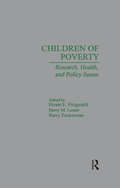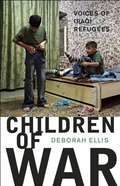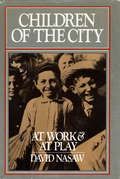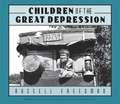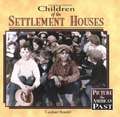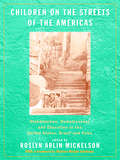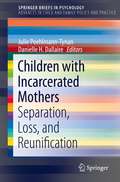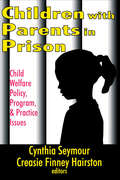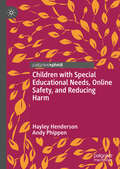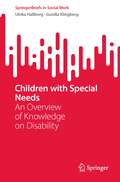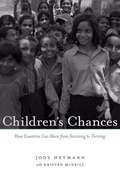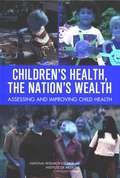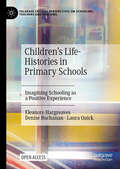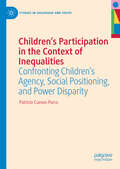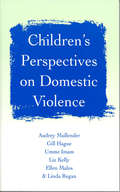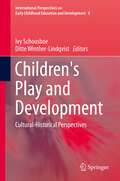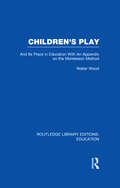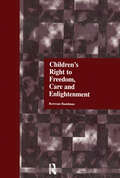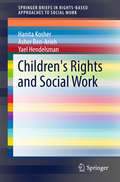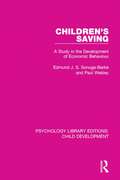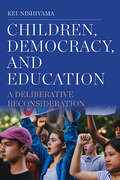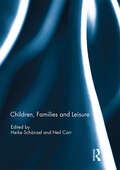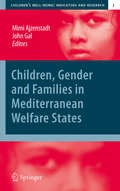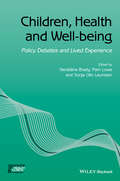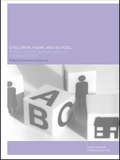- Table View
- List View
Children of Poverty: Research, Health, and Policy Issues (Reference Books On Family Issues #Vol. 23)
by Hiram E. Fitzgerald; Barry M. Lester; Barry ZuckermanA collection of the Proceedings of a Society for Research in Child Development Round Table, held in 1993 by the Society for Research in Child Development (SRCD).The intent of the round tables was "to help chart the course for child development research, health care, and public policy for the next ten years". The contributors believe the papers presented and the round table discussions, along with their broader distribution in this volume, do indeed offer useful insights and powerful guidance to researchers, policy makers, and practitioners and interventionists with a vast range of professional training.
Children of War: Voices of Iraqi Refugees
by Deborah EllisFive years have passed since the U.S. and its allies invaded Iraq, and true democracy has yet to come. Four million Iraqis have been displaced; half are living in desolate tent camps, the others mostly stuck in Jordan and Syrian. All face uncertain futures. In this book, Deborah Ellis turns her attention to the war's most tragic victims -- Iraqi children. She interviews more than 20 young Iraqis, mostly refugees living in Jordan, but also a few trying to build new lives in North America. Some families left Iraq with money; others are penniless, ill, or disabled. Most of the parents are working illegally or not at all, and the fear of deportation is a constant threat. The children speak for themselves, with little editorial comment, and their stories are frank, harrowing, and often reveal a surprising resilience in surviving the consequences of a war in which they played no part.
Children of the City: At Work and At Play
by David NasawA surprising and indelible portrait of the bitter hardships, amazing resourcefulness and unadulterated joys experienced by immigrant children in American metropolises at the turn of the century. The turn of the twentieth century was a time of explosive growth for American cities, a time of nascent hopes and apparently limitless possibilities. In Children of the City, David Nasaw re-creates this period in our social history from the vantage point of the children who grew up then. Drawing on hundreds of memoirs, autobiographies, oral histories and unpublished--and until now unexamined--primary source materials from cities across the country, he provides us with a warm and eloquent portrait of these children, their families, their daily lives, their fears, and their dreams. The true story of the Newsies who successfully organized and struck the newspaper empires of Hearst and Pulitzer.
Children of the Great Depression
by Russell FreedmanAs he did for frontier children in his enormously popular Children of the Wild West, Russell Freedman illuminates the lives of the American children affected by the economic and social changes of the Great Depression. Middle-class urban youth, migrant farm laborers, boxcar kids, children whose families found themselves struggling for survival . . . all Depression-era young people faced challenges like unemployed and demoralized parents, inadequate food and shelter, schools they couldn't attend because they had to go to work, schools that simply closed their doors. Even so, life had its bright spots-like favorite games and radio shows-and many young people remained upbeat and optimistic about the future. Drawing on memoirs, diaries, letters, and other firsthand accounts, and richly illustrated with classic archival photographs, this book by one of the most celebrated authors of nonfiction for children places the Great Depression in context and shows young readers its human face. Endnotes, selected bibliography, index.
Children of the Settlement Houses
by Caroline ArnoldIn the 1880s and 1890s, immigrants from Europe poured into American cities. Most lived in horrific poverty, lacking even such basic services as electricity or running water. A number of idealistic women and men of the middle classes moved into these poverty-wracked neighborhoods and tried to help. These "settlers" worked to bring cultural opportunities to their neighbors and to improve living conditions. From New York to San Francisco they founded some 400 community centers, or settlement houses, where people could gather to study and have fun. This book introduces young children to the settlement house movement and suggests projects to bring settlement history to life.
Children on the Streets of the Americas: Globalization, Homelessness and Education in the United States, Brazil, and Cuba
by Roslyn Arlin MickelsonFirst published in 2000. Routledge is an imprint of Taylor & Francis, an informa company.
Children with Incarcerated Mothers: Separation, Loss, and Reunification (SpringerBriefs in Psychology)
by Julie Poehlmann-Tynan Danielle H. DallaireThis Brief focuses on children with incarcerated mothers, a growing and vulnerable population. It presents five empirical studies, along with an introduction and summary chapter. The five empirical chapters examine new qualitative and quantitative data on: Typical occurrences when pregnant women give birth during incarceration in contrast with the benefits of a prison doula program for mothers and newborns. A mother’s criminal justice involvement for substance abuse crimes and its effects on children’s protective services involvement and foster care placement. How children cope with separation from their mothers because of their incarceration and how that separation continues to affect children's lives following family reunification. Differences in recidivism trajectories between mothers and nonmothers during the 10 years following release from incarceration. Alternatives to incarceration for women in residential drug treatment and how community supervision mandates can affect, contribute to, or extend mother-child separation. The final chapter integrates the information from the empirical studies and summarizes implications for policy and practice. Children with Incarcerated Mothers is an essential resource for policy makers and related professionals, graduate students, and researchers in child and school psychology, family studies, public health, social work, law/criminal justice, and sociology.
Children with Parents in Prison: Child Welfare Policy, Program, and Practice Issues
by Cynthia Seymour Creasie Finney HairstonAdults are being incarcerated in the United States at an ever-escalating rate, and child welfare professionals are encountering growing numbers of children who have parents in prison. Current estimates indicate that as many as 1.5 million children have an incarcerated parent; many thousands of others have experienced the incarceration of a parent at some point in their lives. These vulnerable children face unique difficulties, and their growing numbers and special needs demand attention.Existing literature indicates that children whose parents are incarcerated experience a variety of negative consequences, particularly in terms of their emotional health and well being. They also may have difficult interactions or limited contact with their parents. There are also issues connected with their physical care and child custody. The many challenges facing the child welfare system as it attempts to work with this population are explored in Children with Parents in Prison. Topics covered include: ""Supporting Families and Children of Mothers in Jail""; ""Meeting the Challenge of Permanency Planning for Children with Incarcerated Mothers""; ""The Impact of Changing Public Policy on Relatives Caring for Children with Incarcerated Parents""; ""Legal Issues and Recommendations""; ""Facilitating Parent-Child Contact in Correctional Settings""; ""Earning Trust from Youths with None to Spare""; ""Developing Quality Services for Offenders and Families""; and in closing, ""Understanding the Forces that Influence Incarcerated Fathers' Relationships with Their Children.""Children and families have long struggled with the difficulties created when a parent goes to prison. What is new is the magnitude of the problem. This volume calls for increased public awareness of the impact of parental incarceration on children. Its goal is to stimulate discussion about how to best meet the special needs of these children and families and how to provide a resource for the child welfare community as it responds to
Children with Special Educational Needs, Online Safety, and Reducing Harm
by Andy Phippen Hayley HendersonThis book explores the online behavior and safeguarding of children with special education needs (SEN) in the digital world. Founded in research which evidences key stakeholder perspectives, this book informs and guides stakeholders towards sensibly balancing risk and opportunities online with an understanding that SEN children may face some unique challenges that can place them at greater risk. To develop a child-centered approach, the authors employ an ecosystems theory approach which considers child development as a system of interrelated relationships affected by multiple levels of surrounding environment, drawing upon Bronfenbrenner's seminal work and positioning the research within the field of education.
Children with Special Needs: An Overview of Knowledge on Disability (SpringerBriefs in Social Work)
by Ulrika Hallberg Gunilla KlingbergThere can be a lack of understanding of the vulnerable situation of children with disabilities and their families, even among professional caregivers whose mission is to protect the health and wellbeing of these children. Their respectful treatment should include knowledge, empathy, humanity, and an open and sympathetic dialogue. This book provides an overview of knowledge and literature review of children and adolescents with special care needs that contribute to the respect and understanding of children with disabilities and their families. It also explains possible reasons for different outcomes in research studies and why there is a lack of knowledge in some areas concerning these children. Research on children with disabilities is considerable but often can be difficult to access on many levels, which means it does not always benefit those who need this knowledge. This compact book addresses this by presenting the international research in the field in an understandable way for people who work with children with disabilities and their families. The authors provide a broad picture of the background, reality of life, opportunities for professional help and support, as well as outlook of these children and families. Among the topics covered:The Health and Well-being of Children with DisabilitiesThe Health and Well-being of RelativesOccupationOn the Road to AdulthoodChildren with Special Needs: An Overview of Knowledge on Disability is pertinent reading for students in all areas of health care (including nursing and psychology), social work, sociology, and education aimed at children and young people. The text also would be of interest to those who practice in these areas and/or encounter children with disabilities in their daily work.
Children's Chances
by Jody HeymannChildren’s Chances urges a shift from focusing on survival to targeting children’s full and healthy development. Drawing on comparative data on policies in 190 countries designed to combat poverty, discrimination, child labor, illiteracy, and child marriage, Heymann and McNeill tell what works to ensure equal opportunities for all children.
Children's Health, The Nation's Wealth: Assessing And Improving Child Health
by National Research Council Institute of Medicine of the National AcademiesChildren&#39s health has clearly improved over the past several decades. Significant and positive gains have been made in lowering rates of infant mortality and morbidity from infectious diseases and accidental causes, improved access to health care, and reduction in the effects of environmental contaminants such as lead. Yet major questions still remain about how to assess the status of children's health, what factors should be monitored, and the appropriate measurement tools that should be used. Children's Health, the Nation's Wealth: Assessing and Improving Child Health provides a detailed examination of the information about children's health that is needed to help policy makers and program providers at the federal, state, and local levels. In order to improve children's health -- and, thus, the health of future generations -- it is critical to have data that can be used to assess both current conditions and possible future threats to children's health. This compelling book describes what is known about the health of children and what is needed to expand the knowledge. By strategically improving the health of children, we ensure healthier future generations to come.
Children's Life-Histories in Primary Schools: Imagining Schooling as a Positive Experience (Palgrave Critical Perspectives on Schooling, Teachers and Teaching)
by Eleanore Hargreaves Laura Quick Denise BuchananThis open access book explores schooling from the perspective of children via data from a longitudinal life-history study. It questions whether schooling creates an environment where all children to flourish; or whether a policy focus on attainment in mathematics and English hinders some children’s wellbeing and learning. By drawing on the children’s life-history narratives and their ideas, the chapters also portray children’s realistic suggestions for practices that meet the needs of diverse children and strengthen their comprehensive wellbeing and learning within schooling.
Children's Participation in the Context of Inequalities: Confronting Children's Agency, Social Positioning, and Power Disparity (Studies in Childhood and Youth)
by Patricio Cuevas-ParraThis book takes up theoretical and practical discussions of children and young people's participation in public decision-making by taking into account existing literature from throughout childhood studies, sociology of childhood, children's human rights studies, decolonization studies, and intersectionality studies. Through case studies conducted in Brazil, Bangladesh, Sierra Leone, and Ghana, Cuevas-Parra provides extensive empirical data from beyond the Global North and confronts dominant views of power, inequalities, and agency. The understanding that children and young people are immersed in intersectional social structures, where they are never 'simply children' but individuals with multiple specific identities, cuts across the book.
Children's Perspectives on Domestic Violence
by Liz Kelly Linda Regan Gill Hague Audrey Mullender Umme F. Imam Ellen Malos`The research methodology and the problems encountered when studying a subject such as domestic violence, coupled with the ethical problems of researching with children, are discussed at length in the book. This gives a good insight into the intricacies of conducting such a research study. The research looked not only at children who were known to have direct contact with domestic violence, but also what children in general thought and felt about domestic violence. The presentation of the findings, both in tabular and narrative form, was well presented' - Accident and Emergency Nursing Journal `This book offers accessible and interesting reading. It is well written as one would expect from these authors.... There are a lot of pointers for the way forward in terms of both policy and practice. This is likely to become a seminal text' - Research Policy and Planning 'This is a useful and challenging read for all of us who seek to work effectively and ethically in this complex area of practice' - Professional Social Work `Just looking at the authors of this book tells the reader that they are about to embark on a pioneering piece of academic research... a comprehensive and authoritative piece of work' - Domestic Abuse Quarterly `A vital tool for all those working with children' - ChildRight 'Written in a lucid style and is easy to read... it is essential reading for all students in social work undergraduate courses and also in post-qualifying courses on child welfare and protection. In addition professionals who are directly working in the area of child protection, schools and criminal justice settings would find this book informative and useful in understanding what children and young people want, and need, in relation to living in domestic violence situations' - Child and Family Social Work 'This book is powerfully written and is essential reading for professional working with and supporting abused women and their children. Its groundbreaking focus on children's experiences adds much to our understanding of the complexities of domestic violence' - Journal of Family Studies 'A treasure-chest of rich, diverse and powerful extracts from children and young people... in particular the material presented on different coping strategies used by children who have experienced domestic violence is an important contribution to an area about which very little is known' - Adoption and Fostering Journal How do children who live with domestic violence cope? How do they make sense of their experiences? Do they receive the right sort of help from formal and informal sources? Drawing on the newest research designed to hear the voices of children and young people, this important book examines children's experiences and perspectives on living with domestic violence. The authors explore: - the effect of domestic violence on children - what children say would help them most in coping with domestic violence - the advice children would offer other children who find themselves in similar circumstances, their mothers and the helping professions. This accessible book written for students, their teachers, researchers and all those working with children - across social work, health, child psychology and psychiatry, the law and education - will provide a vital insight into children's own perspectives on domestic violence.
Children's Play and Development: Cultural-Historical Perspectives (International Perspectives on Early Childhood Education and Development #8)
by Ditte Winther-Lindqvist Ivy SchousboeThis book provides new theoretical insights to our understanding of play as a cultural activity. All chapters address play and playful activities from a cultural-historical theoretical approach by re-addressing central claims and concepts in the theory and providing new models and understandings of the phenomenon of play within the framework of cultural historical theory. Empirical studies cover a wide range of institutional settings: preschool, school, home, leisure time, and in various social relations (with peers, professionals and parents) in different parts of the world (Europe, Australia, South America and North America). Common to all chapters is a goal of throwing new light on the phenomenon of playing within a theoretical framework of cultural-historical theory. Play as a cultural, collective, social, personal, pedagogical and contextual activity is addressed with reference to central concepts in relation to development and learning. Concepts and phenomena related to ZPD, the imaginary situation, rules, language play, collective imagining, spheres of realities of play, virtual realities, social identity and pedagogical environments are presented and discussed in order to bring the cultural-historical theoretical approach into play with contemporary historical issues. Essential as a must read to any scholar and student engaged with understanding play in relation to human development, cultural historical theory and early childhood education.
Children's Play and Its Place in Education: With an Appendix on the Montessori Method (Routledge Library Editions: Education)
by Walter De Burley WoodPublished long before the importance of early childhood education was formally recognised in the educational landscape this book explores the significance of play for young children. The volume includes an appendix on Montessori education.
Children's Right to Freedom, Care and Enlightenment
by Bertram BandmanFirst published in 1999. Routledge is an imprint of Taylor & Francis, an informa company.
Children's Rights and Social Work (SpringerBriefs in Rights-Based Approaches to Social Work)
by Asher Ben-Arieh Hanita Kosher Yael HendelsmanThis book provides a conceptual framework for children's rights as well as specific strategies and opportunities for social workers to apply in their work. It guides social work professionals and students through the history of children's rights. It also includes a call for a paradigm shift from a focus on the right to nurturance to the right to self-determination, as well as a contrasting look at children's rights in the West versus the rest of the world.
Children's Saving: A Study in the Development of Economic Behaviour (Psychology Library Editions: Child Development #15)
by Paul Webley Edmund J.S. Sonuga-BarkeOriginally published in 1993, this book presents an alternative approach to the study of the emergence of economic awareness during childhood: a new developmental economic psychology! In the past, attempts to study the emergence of children’s economic consciousness have failed to take account of the practical nature of the "economic" in the history of western cultures. Economic socialisation has been seen as the acquisition of abstract knowledge about the institutions of adult economic culture. The child has been seen as a spectator, acquiring knowledge of that culture, but never really a part of it. However, economic actions, in essence, are directed not towards the attainment of knowledge, but rather towards the practical solution of problems of resource allocation imposed by constraint. Children, just like adults, are faced with practical problems of resource allocation. Their response to these problems may be different from those of adults but no less "economic" for that. This realisation forms the heart of this book. In it children are seen as both inhabitants of their own "playground" economic subculture and actors in the wider economic world of adults, solving, or attempting to solve, practical economic problems. In order to highlight this "child-centred" approach, the authors studied the way children tackle the particular problems posed by limitations of income. How do children learn (a) the relationship between choices available in the present and the future, (b) to spread their limited financial resources over time into the future and (c) about the strategies, such as banking, that allow them to protect those resources from threats and temptations? In short, how do children learn to save? This volume goes some way to answering these and related questions and in so doing sets up an alternative framework for the study of the emergence of economic awareness.
Children, Democracy, and Education: A Deliberative Reconsideration
by Kei NishiyamaLooks at the present norms and practices of a new form of democratic education and children's democratic participation, utilizing both theoretical and empirical examination of children's deliberative agency.How children participate in democracy has shifted toward more communicative, networked, and creative models than before. In political science and political theory, however, surprisingly little is understood about what if anything children can contribute to democracy and how they would do so. Traditionally, children have been considered as mere future citizens who are acknowledged only when they behave in accordance with adults' expectations. In this sense, children are one of the last frontiers of democratic inclusion, as they have long been seen and not heard. Children, Democracy, and Education critically examines and proposes how to counteract such a traditional view on children and retheorizes their position and role within contemporary democracy. Utilizing the empirically grounded concept of deliberative democratic learning, Kei Nishiyama then argues how we enable children's communicative participation and development in classrooms, schools, and social movements to expand the inclusive quality of democracy.
Children, Families and Leisure
by Heike Schänzel Neil CarrThis book aims to further academic debate within the leisure and tourism studies community about the role of ‘families’ in contemporary life and the experiences of families and their children in the leisure environment. It is based on the recognition of the diverse nature of the family in the contemporary era and the position of children in families and society in general as active and knowing social agents rather than as passive objects. The family is on the one hand our first community with its own special kind of human attachment and on the other a little world on which the larger society is modelled. Families form the closest and most important emotional bond in humans. This relationship is what drives humanity and society, and positions families at the centre of leisure activities. This international and multi-disciplinary compilation of recent research into children and families examines progress made and challenges ahead for leisure studies. It extends the academic discourse to a wider understanding of what families, children and their leisure behaviour mean in today’s societies. This book was originally published as a special issue of Annals of Leisure Research.
Children, Gender and Families in Mediterranean Welfare States (Children’s Well-Being: Indicators and Research #2)
by John Gal Mimi AjzenstadtThe study of welfare states and social policy has enjoyed growing popularity in the last three decades. This field has been characterized by a growing level of theorization, richer case study analyses, inclusion of additional sources of welfare provision (non-profit, market-based, informal, family) and fields of study (globalization, gender, ethnicity, immigration, children), and increasingly complex, accurate and up-to-date cross-national comparative analyses. One of the subjects that have been the focus of much interest has been that of families, women and children - their social well being and their legal and economic status in the welfare state. The common assumption is that there is a clear relationship and interaction between the structuring of the welfare state and the well-being and social status of these subs groups. Cross-national comparative analyses have shown that this interaction differs significantly from country to country, depending on the culture, religion as well as on its welfare regime. Scholars are engaged in diverse efforts to understand the differences between these policies in diverse welfare states, the reasons for these differences and their results. This volume deals with these issues from a unique welfare regime perspective. While over the last two decades research on welfare states has generally tended to assume that these nations can be divided into welfare regimes with common characteristics, there has been much ambivalence towards, and much less study of, the welfare states in the Mediterranean region. This volume focuses on these welfare states and makes the case for regarding the nations in this region as belonging to a common family of nations. It then seeks to compare policies towards children, families and gender in these nations. The volume will seek to further this research agenda by including an initial section that offers an overview of the Mediterranean welfare states, and then discusses issues of children, families and gender in general. The second part of the book will offer detailed country studies of these issues, all authored by leading experts in the various countries.
Children, Health and Well-being: Policy Debates and Lived Experience (Sociology of Health and Illness Monographs)
by Pam Lowe Geraldine Brady Sonja Olin LauritzenThis book brings together new and leading scholars, who demonstrate the importance of research with children and from a child perspective, allowing for a fuller understanding of the meaning and impact of health and illness in children’s lives. Demonstrates the importance of research with children and research from a child perspective, in order to fully understand the meaning and impact of health and illness in children’s lives Encourages critical reflection on contemporary health policy and its relationships to culturally specific ways of knowing and understanding children’s health Brings together new and leading scholars in the field of children’s health and illness Moves the highly important issue of children’s health into the mainstream sociology of health and illness
Children, Home and School: Regulation, Autonomy or Connection?
by Ros EdwardsIn contemporary western societies, there are increasing emphases on children being the responsibility of their parents, contained within the home, and on their compartmentalisation into separate and protected organised educational settings. Thus 'home' and 'school' form a crucial part of children's lives and experiences.This book explores the key institutional settings of home and school, and other educationally linked organised spaces, in children's lives, and the relationships between these. It presents in-depth discussions concerning new research findings from a range of national contexts and focuses on various aspects of children's, and sometimes adult's, own understandings and activities in home and school, and after school settings, and the relationship between these. The contributors assess children from a variety of backgrounds and circumstances and consider how these children see and position themselves as autonomous within, connected to or regulated by home and school. Discussion of the impact of policy and practice developments on the everyday lives of these children is also included.
